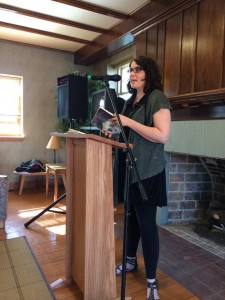Countless acts of literary citizenship are already listed here, here, here, and here. But here are our top thirteen ways of being a literary citizen:
1) Social Media: Follow #litcitizen posts on Twitter and work to promote the work of writers you enjoy on Twitter, Facebook, Tumblr, etc. Rule of thumb: for each time you talk about your own writing, mention someone else’s work five times. A great example is fiction writer Kyle Minor who used a great review in the NYTimes Book Review as a chance to mention other writers he admires.
2) Spread the word: Share publications and articles that might interest others and make them involved with literary events. This world is full of information and facilitating good quality articles is a good way to stay informed and help others stay informed as well.
3)Support the writers: The most obvious way of supporting is buying. Try buying at independent stores around your neighborhood. A subscription to a magazine or literary journal is always an option to keep yourself engaged and supportive of the literary community. These are two web pages suggested by Sambuchino to find the store closest to you: Indie.org and Powells. He also suggests the program by the Council of Literary Magazines and Presses for those professors and students who want to incorporate magazines in their courses.
4) Books: Don’t just buy them. Turn the individual reading process into a social process by sharing what you think. Talk to your friends about what you are reading. Even if they are not the most book friendly people, whenever they feel like reading a book, they will come back to you for recommendations. Use any of the ideas triggered by a book in your conversations. This will make people (and even yourself) realize the value of reading.
5) Get caught!: (Reading) Take your books and go read at the park, at the bus stop, at the train station, and (why not?) at the bar. Let people know that reading remains a commonly enjoyable pursuit.
 6) Attend literary events: The more events you attend, the more you will learn about your own reading taste, in addition to meeting new people that share the same interests as you do.
6) Attend literary events: The more events you attend, the more you will learn about your own reading taste, in addition to meeting new people that share the same interests as you do.
7) Build your own literary network and help others, too: Introduce a friend to another friend with similar literary interests. Invite your friends to literary events you think might interest them. Keep inviting your friends even if they don’t go at first. They will show up one day and even bring their own friend.
8) Stick to those you trust: Here are ways of finding a writing group. With time you will learn who it is you like to work with. Keep them close to you as reading and writing advisors who share and review work with you. They will be familiar with your style and your projects and will serve as excellent reviewers and proofreaders.
9) Don’t forget the future: Don’t underestimate the power of reading to kids. Frequently, reading habits are learned when parents read to their children routinely. If you have little ones in your family, sharing a fun book with them could be the key to instill curiosity for reading in them.
 10) Share the love: Did you like the last book you read? Did it change your perspective of life in some way? Were you impressed by the writing style? Then say it. Let the author know that you appreciate their work by an email or a letter. Even if you don’t get an answer, writers will always be moved by honest and smart responses to their work.
10) Share the love: Did you like the last book you read? Did it change your perspective of life in some way? Were you impressed by the writing style? Then say it. Let the author know that you appreciate their work by an email or a letter. Even if you don’t get an answer, writers will always be moved by honest and smart responses to their work.
11) Create a blog: Blogging is a great way to let the world know what you have to say. Write book reviews, post about recent authors, give a space for people to comment on the books they have read and for local authors to promote their work.
12) Join a book club: A book club is the perfect way to keep yourself engaged in active reading, and helps to promote and organize social literary events.
13) Volunteer work: Involve your community in the reinforcement of a reading and writing culture. Start your own book club, read to the kids in the library, work with the library to organize events for local authors, donate your old books to people who would appreciate them or proofread others’ drafts.
Any other idea or response on how to be a literary citizen? Let us know with a comment!


One thought on “13 Ways of Being a Literary Citizen”